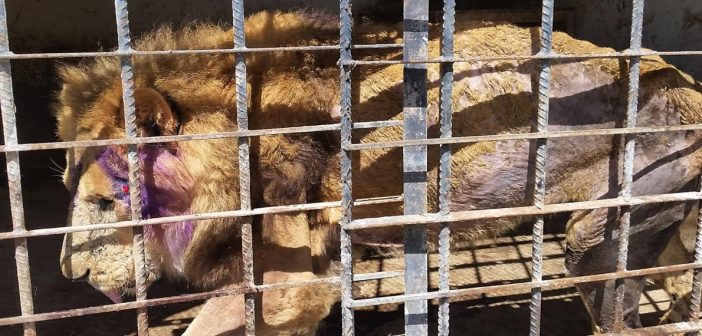The 265 animals in Yemen’s Taiz Zoo, including rare leopards, haven’t been fed for days. The government is rejecting proposals to save them.
The story began early this year when the Yemeni government, which runs the zoo, stopped paying the staff and abandoned the facility in the face of escalating violence. In February, after a media flurry drew international attention to the deteriorating conditions at the zoo, SOS Zoo and Bear Rescue—a rescue organization established on Facebook by Chantal Jonkergouw—began raising funds to cover the cost of food, water, and care for the animals. According to Jonkergouw, who lives in Sweden, SOS has raised more than $125,000 from individual donors during the past ten months.
According to Jonkergouw, before SOS intervened, 11 lions and six Arabian leopards had starved to death. “One leopard had eaten its female companion,” she says. The surviving animals were found living in squalor on bare concrete, bloodied, with festering abscesses, feces everywhere. One drastically malnourished lion was found with his hip bone jutting through his skin. Emergency surgery saved his life, barely.
Other animals in the zoo include hyenas, monkeys, birds, porcupines, baboons, and guinea pigs. Many of the creatures have displayed signs of severe zoochosis—a condition that often afflicts animals kept captive in artificial environments and is characterized by obsessive, repetitive behaviors. The din and detritus of war may compound the suffering: In mid-December a nearby building was bombed, spraying shrapnel into the zoo’s grounds.
The proximity of the fighting complicates rescue efforts: Other than the SOS-funded Tamdeen Youth Foundation, a local group that has provided all food, care, and water for the animals, no other organization has been involved on the ground—it’s too dangerous.
The Yemeni government, which now has limited sway in Taiz, has denied the transfer permits that might at least give the animals a chance of being extracted from Houthi territory and brought to another country where they would have hope for long-term survival.
SOS has kept the animals alive at a cost of $4,000 a week, covering food and care and modest salaries for a small staff of six, Jonkergouw says. SOS had just $10,000 left when at the end of last month she decided to cut off the food supplies.
“Without [the Yemeni government]being cooperative towards finding a real solution, I don’t think it’s acceptable any longer” for SOS to provide the funding and care that the government won’t, she says. “They need to feel it. The problem is, it’s at the expense of the animals, but there’s no other option. Whatever we do, the animals will suffer.”
Evacuating so many captive animals from the heart of a war zone would present the Yemeni government with a dangerous logistical challenge, but offers of safe havens have been made.
The Princess Alia Foundation in Jordan and the Breeding Centre for Endangered Arabian Wildlife in the United Arab Emirates, in conjunction with that country’s Al Ain Zoo, have both said they’d take the animals. It could cost up to $500,000 USD to evacuate the zoo, which would require an armed guard to ensure safe exit. Jonkergouw is confident that her organization and others could raise the money with aid from NGOs but emphasizes that Yemen first needs to agree to facilitate an evacuation. The International Union for Conservation of Nature, the body that monitors the conservation status of species, has actively been trying to broker an agreement between Yemen and the UAE-based rescue facilities, to no avail yet.
Yemeni government officials have told Jonkergouw that they won’t entertain either offer. “They replied that they will never let the animals out of Yemen and that the animals were well cared for and doing fine. And then I really got pissed,” Jonkergouw says. “I said, why are they fine? I raised $125,000 and paid most of that into this project without getting any real cooperation on a sustainable solution for these animals. So I’m fed up with this. I will stop.”
Read Full Story Here : National Geographic Story
Sign these petitions to Yemen’s government to care for the Taiz Zoo animals and transfer them to a sanctuary:
https://www.change.org/p/president-close-taiz-zoo-and-release-all-animals-to-sanctuary
Contact Yemen’s government directly:
Ministry of Water and Environment (oversaw Taiz Zoo)
P.O. Box 19237, Sana’a, Yemen
Tel: 967-1-418-290, 967-1-418-291
Fax: 967-1-418-285, 967-1-470-802
Website: http://www.mweye.org/
E-mail: mwe@mweye.org
Embassy of the Republic of Yemen, United States
2319 Wyoming Ave NW
Washington, D.C. 20008
Tel: (202) 965-4760
Fax: (202) 337-2017
Website: http://www.yemenembassy.org/
E-mail: information@yemenembassy.org





